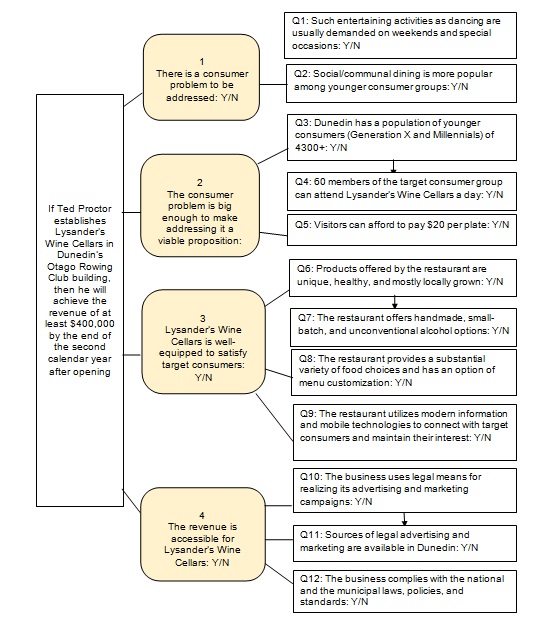Research Proposition
The research proposition for the planned business endeavor will be as follows: If Ted Proctor establishes Lysander’s Wine Cellars in Dunedin’s Otago Rowing Club building, then he will achieve the revenue of at least $400,000 by the end of the second calendar year after opening. This proposition captures the desired business outcome and indicates the major objective of the intended research: to evaluate the chances for Lysander’s Wine Cellars to become profitable and economically sustainable.
However, to explore the abovementioned outcome, a range of additional issues that contribute to greater business profitability must be investigated as well. They include
- the availability of potential consumers in the area,
- the scale of match/gap between local consumers’ interests/needs and Mr. Proctor’s business offer, and
- the accessibility of revenue.
Based on this, the scope of the present research will be primarily defined by the evaluation of the existing consumer problem. Specific questions addressing this matter will be targeted at the analysis of consumer population characteristics, needs, and preferences, as well as the extent of the consumer problem. The latter will be measured by exploring the size of the consumer population, relevant consumer trends, and behaviors.
Another important set of research questions will cover the issues related to the planned business’s ability to satisfy local consumer needs. Does the type of services and products offered by Lysander’s Wine Cellars correspond to consumer interests and preferences? Does it offer enough or too little service/product variety to foster positive customer experiences? The questions in this research category will allow seeing whether the business owner has chosen the right strategic orientation, whereas the answer will assist in correcting the course of action if needed. One more set of questions proposed for testing the validity of the introduced proposition will investigate the legal/political and marketing environment in Dunedin. As part of this effort, laws, policies, and standards to which Lysander’s Wine Cellars is required to comply will be analyzed along with the feasibility of performing various marketing activities in the region. These environmental factors can substantially interfere with or facilitate the organization’s ability to generate profit, and therefore their evaluation is pivotal for meeting the desired business outcomes.
Scoping Process Diagram

“Big Four” Questions
The first category of the “Big Four” questions (highlighted with yellow in the flow diagram) is concerned with the consumer problem that defines the origins of consumption. Thus, the formulated questions aimed to identify general consumer trends: what motivates individuals to dine out and which specific group of customers can be attracted by Mr. Proctor’s offer. The findings of basic preliminary marketing research were used to prompt the creation of these questions. For instance, Q2 was formulated based on an assumption that younger adult individuals (age 20-40) tend to be more interested in social dining than representatives of older generations. Thus, the planned business can be more appealing to the former group of potential customers.
The second group of questions is dedicated to the evaluation of the restaurant-specific consumer trends and numbers related to them. For instance, Q4 and Q5 were generated considering the desired financial outcome set in the research proposition: the revenue of $400,000. Based on this, it was estimated that approximately 55-60 individuals must visit the restaurant every day and spend there at least $20. Likely, customers will not dine in the restaurant every day, but a realistic number of individual visits a year can reach 5. Hence, the city must have a total population of over 4300 younger and middle-aged adults to meet the established revenue goals.
The third group of “Big Four” questions is also developed based on the results of basic marketing research. It was revealed that younger adults tend to prefer healthy and versatile menus (Q6 and Q8). Their interest in locally grown, “soul” food is also translated into greater demand for handmade and small-batch alcohol options (Q7). Besides, younger adults mainly use social media and other mobile technologies to communicate. Thus, the business’s online presence will add value for consumers (Q9).
Lastly, legal factors (existing and pending legislation) can greatly impact the industry and businesses operating within it. Therefore, it is essential to take into account the business’s compliance with both national and municipal regulations (Q12). Otherwise, the company may bear substantial financial losses due to illegal and substandard activities. Additionally, advertising allows for attracting more customers and gaining greater profits. Therefore, the legality and availability of advertising/marketing possibilities will be explored through Q10 and Q11.